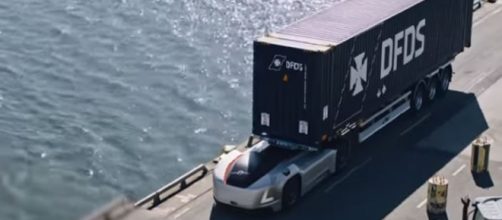Volvo Trucks' Vice President of Autonomous Solutions, Mikael Karlsson was very aware of the continuing boom in e-commerce and saw the need to develop an autonomous transport solution. His solution was to develop Vera, an electric pod vehicle designed to use the technology of automation, connectivity, and electromobility. Vera would allow for the round-the-clock operations with trouble-free transport of goods from one hub to another. The use of this electric vehicle could decrease noise, fuel consumption, and exhaust emissions. Volvo Trucks built Vera not only to work with today's infrastructure and global logistics system but with the capability of being upgraded to meet other types of applications in the future.
Vera's first project
On Thursday, June 14, 2019, Volvo Trucks' announced Vera's first project that will allow this electric pod vehicle to perform its intended purpose of short distance repetitive assignments in logistics centers, factories, and ports. Vera will become an integrated solution to transport goods in Gothenburg, Sweden from a DFDS logistics center to an APM Terminals port facility for distribution across the world. The goal is to achieve a connected system of several Vera vehicles that will facilitate a seamless and constant flow on predefined public roads in an industrial area that is monitored via a control tower. Vera vehicles are best for short distances at the maximum speed of 40 mph and transporting large volumes of products in industrial areas.
Nvidia joins with Volvo
This Tuesday, June 18, 2019, Nvidia Corp. founder and CEO Jensen Huang announced they are partnering with Volvo to further the development of driverless commercial vehicles with the use of their artificial intelligence (AL) programs.
Nvidia will work on developing software programs for training and test simulation, develop onboard computers and sensor path systems; all with a focus on increasing driver-less commercial truck safety. Nvidia and Volvo's end goal is to revolutionize the driver-less commercial vehicles by injecting them into the future with the latest technology and enabling them to operate on their own on public roads and highways.
Self-driving trucking is not driverless
Technology is catching on fast and many trucking companies are looking to fill our roads with self-driving commercial vehicles by 2024. Truck drivers and new recruits need to start taking steps to equip themselves with the knowledge and skills to transition to autonomous trucks, as States are changing transportation laws to suit driverless trucks. Truck drivers will still be needed to take control in situations where computers cannot, like altering routes due to storms, flooding, or detours for unforeseen events.


